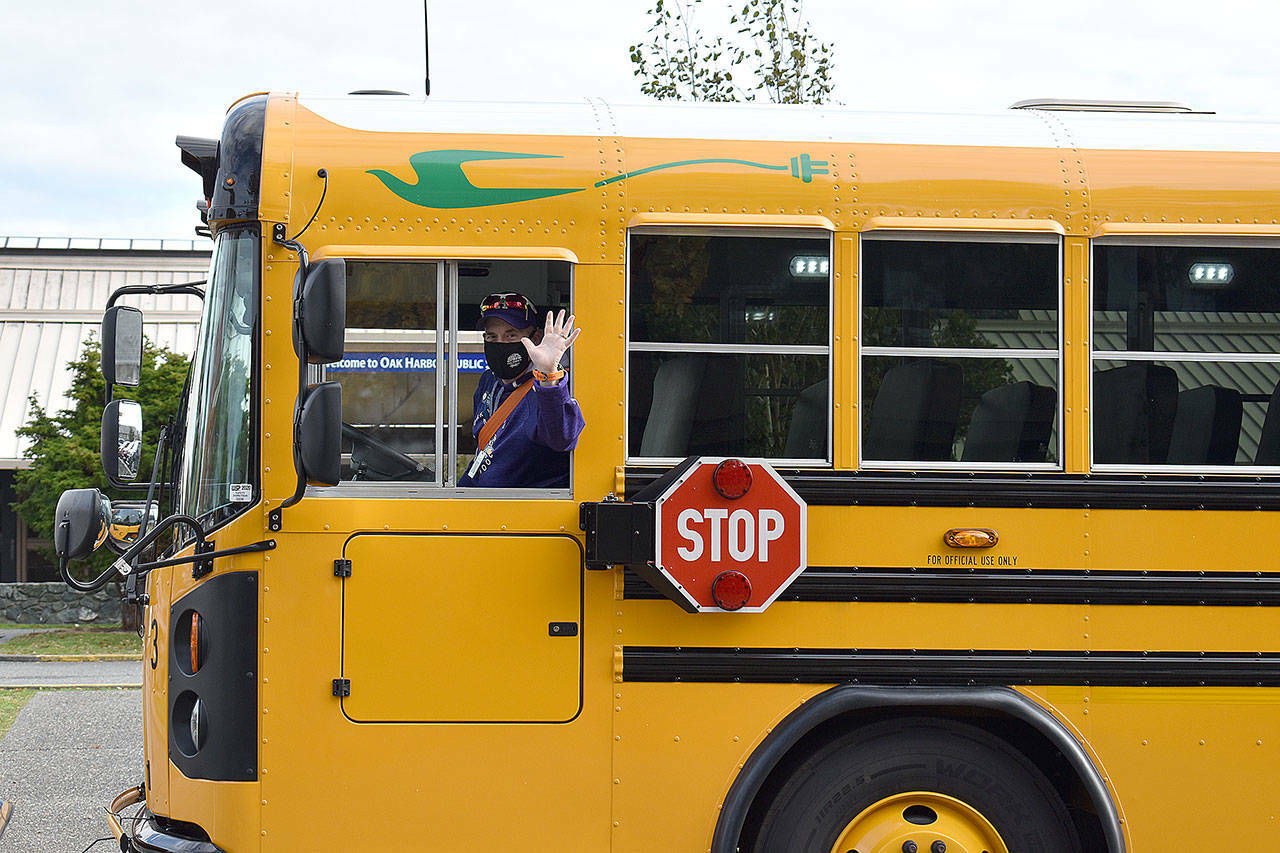The Oak Harbor School Board formally endorsed a proposal to petition the state legislature for green infrastructure funds for school districts April 25, during the same meeting in which it voted to purchase two new diesel-powered school buses.
Members of the public attended the meeting to weigh in on the actions, with most commenters voicing support for the electrification of the school district’s bus fleet and other eco-friendly measures and encouraging the board to invest in electric buses.
Board member Bob Hallahan submitted a proposal to amend the legislative priorities of the Washington State School Directors Association, or WSSDA, to include a focus on climate change mitigation by reducing school districts’ carbon emissions.
Hallahan proposed that WSSDA lobby the state legislature for funds to help schools replace diesel-powered buses and petroleum-powered heating and cooking systems with electric versions. His proposal specifically requested that the legislature allocate districts enough money to cover the difference between the electric buses and their less expensive diesel counterparts.
The proposal also asks the legislature to fund an office of technical assistance for school districts transitioning to lower-emission systems.
“Because it’s a state goal for districts to get the carbon out, they have an interest in helping us, and we all have an interest in making it happen quickly,” Hallahan said in an interview with the Whidbey News-Times.
Hallahan said his proposal may be consolidated with other similar proposals from WSSDA’s legislative committee. WSSDA’s legislative priorities guide and shape its requests to the state legislature.
Oak Harbor School Board members voted unanimously to endorse Hallahan’s proposal, though later in the same meeting, they also voted to purchase two new diesel-powered school buses.
Hallahan provided the lone dissenting vote against the purchase.
“I feel like this proposal violates several of our core values,” he said of the motion to buy the diesel buses during Monday’s meeting, adding that he felt they had a responsibility to use existing technology to address the climate issue now and “not push the problem onto yet another generation like our parents pushed it onto ours.”
He referenced recent extreme weather events caused by climate change, such as the heat wave that caused several hundred heat-related deaths in Washington, Oregon and British Columbia in June of last year, saying that such events should have “recalibrated the way people think” about the importance of climate change mitigation measures.
He also noted that surveys have shown the climate crisis is a significant cause of anxiety among youth.
While board members acknowledged the legitimacy of Hallahan’s concerns, they said replacing the district’s oldest buses is a safety issue that cannot wait until the district can secure the funds for more expensive greener buses, nor did they feel it appropriate to divert money away from students’ more immediate learning needs to fund fleet electrification.
Though electric buses save money over time, Hallahan told the News-Times, the initial cost of an electric bus is currently far greater than that of a diesel bus, and while decarbonizing the district is an important long-term need, schools have short-term needs that also require cash.
Other board members also said that while diesel vehicles don’t compare to electric ones in terms of eco-friendliness, they felt new diesel buses would at least be cleaner than the older models the district currently uses.
“A new diesel bus is better than a 20-year-old diesel bus,” Superintendent Karst Brandsma said.
A number of community members turned up to voice their support for pursuing decarbonization measures in the district, particularly electric buses.
“Moving forward with electrification of our schools and school buses in every way that we can is going to help afford a future that will be viable for our students,” said community member Gary Piazzon.
Public comments also discussed the negative physical and emotional health consequences youth suffer due to climate change.
“How come we’re funding a school district that educates our youth kicking the can down the road and ignoring climate change issues to buy a diesel bus?” said Paul Belanger.
Only one public commenter did not support electrification of school buses and other climate change mitigation measures.
Former school board candidate Jessica Thompson urged school board members not to support Hallahan’s legislation priority proposal, saying the green initiative “comes with a price tag,” and instead asked the board to “urge WSSDA to address a much more important issue that heavily impacts our democracy and our children far more than whether or not they have green school buses or green cooking methods in the kitchen.”
Thompson told the board that rather than asking WSSDA to lobby for state funding to reduce the district’s carbon emissions, it should be asking WSSDA to leave the National School Board Association, an organization which she said does not support parents’ role as the primary stakeholders in their children’s education.
Thompson lost by a narrow margin to former school board President John Diamond in last November’s general election. Some members of the community have come forward in support of Thompson and asked the board to consider her as they seek a replacement for Diamond, who resigned from the board earlier this month.



